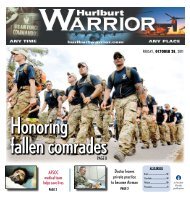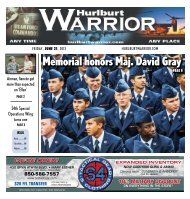Download - Hurlburt Warrior
Download - Hurlburt Warrior
Download - Hurlburt Warrior
Create successful ePaper yourself
Turn your PDF publications into a flip-book with our unique Google optimized e-Paper software.
Page 12 | <strong>Hurlburt</strong> <strong>Warrior</strong> | Friday, May 25, 2012<br />
Will Supreme Court review how states treat vets’ disability pay?<br />
A disabled veteran has<br />
asked the U.S. Supreme<br />
Court to consider anew<br />
whether states violate federal<br />
law when they allow<br />
divorce courts to count a<br />
veteran’s disability compensation<br />
in calculating<br />
spousal support.<br />
The petition also invites<br />
the justices to consider<br />
an issue that states are<br />
more sharply divided over:<br />
whether federal law bars<br />
state courts from considering<br />
VA disability benefits<br />
communal property to<br />
be divided in divorce like<br />
other marital assets.<br />
In dissolving the near<br />
20-year marriage of Peter<br />
James Barclay, an Air<br />
Force veteran, and his wife<br />
Claudia Kay, an Oregon<br />
district court judge in 2010<br />
considered the value of<br />
Peter’s VA disability payments<br />
in awarding spousal<br />
pay of $1,000 a month. His<br />
only income is VA benefits<br />
and Social Security Disability<br />
Insurance, a taxfree<br />
total of just over $4,400<br />
a month.<br />
Barclay, 42, suffers from<br />
post-traumatic stress from<br />
his role as a Tinker Air<br />
Force Base first-responder<br />
to the 1995 bombing of<br />
the federal building in<br />
Oklahoma City. Barclay<br />
cleared debris and helped<br />
in recovery the dead and<br />
wounded. In time, PTSD<br />
made him unemployable<br />
and eligible to draw VA<br />
compensation at the 100-<br />
percent disabled rate.<br />
Barclay argued at trial<br />
that to include his disability<br />
pay in calculating<br />
spousal support would violate<br />
federal law. The court<br />
ignored that argument and<br />
the Court of Appeals of Oregon<br />
affirmed its decision.<br />
His Washington, D.C.,<br />
attorney, Michael D.J.<br />
Eisenberg, petitioned the<br />
Supreme Court this month<br />
to consider whether<br />
Title 38 U.S. Code, Section<br />
5301(a), which makes VA<br />
disability benefits immune<br />
“from taxation, claims of<br />
creditors, attachment,<br />
levy and seizure,” doesn’t<br />
also bar inclusion of disability<br />
pay, directly or indirectly,<br />
in spousal support<br />
calculations.<br />
“We have two good<br />
reasons to be heard before<br />
the court,” Eisenberg said<br />
in an interview. “One is<br />
the fact that the states<br />
are ignoring federal law.<br />
And two, states are split<br />
on how they are executing<br />
federal law.”<br />
The petition concedes<br />
that most states have adopted<br />
the approach used<br />
in Oregon that disability<br />
Tom<br />
Philpott<br />
pay can be<br />
used toward<br />
alimony.<br />
This<br />
is based<br />
on the<br />
Supreme<br />
Court’s<br />
1987 Rose<br />
decision,<br />
which said<br />
the legislative<br />
history of VA disability<br />
benefits shows that these<br />
payments are intended to<br />
compensate both the veteran<br />
“and his family.”<br />
Eisenberg disagrees.<br />
Disability pay, he said, is<br />
to compensate the veteran<br />
for loss of income due<br />
to a service-connected<br />
medical condition. If the<br />
veteran has a spouse, VA<br />
compensation tables set<br />
payments higher. But that<br />
extra amount, in recognition<br />
of the sacrifice the<br />
spouse makes in living<br />
with a disabled vet, stops<br />
if veteran gets divorced.<br />
That means the spouse<br />
has no direct claim on the<br />
compensation.<br />
“It’s not like the veteran’s<br />
disability caused the<br />
spouse a military-related<br />
disability,” Eisenberg said.<br />
If a former spouse has<br />
no disability, she “has<br />
an advantage over the<br />
veteran” that the Oregon<br />
court should have considered<br />
and not try, using VA<br />
compensation, to “even the<br />
playing field.” Doing that<br />
gives the former spouse<br />
an advantage over the veteran,<br />
he said.<br />
Barclay’s former<br />
spouse claims to have<br />
disabilities of her own.<br />
But Eisenberg said relief<br />
should come from a state<br />
or federal assistance program<br />
such as Social Security<br />
Disability Insurance,<br />
not the veteran’s benefits.<br />
Eisenberg acknowledged<br />
that a Supreme<br />
Court ruling in favor of<br />
Barclay would not be a<br />
happy result for many former<br />
spouses of veterans.<br />
“But let us not forget<br />
these VA benefits are to<br />
make persons whole for<br />
loss of either physical or<br />
mental disability incurred<br />
while they are serving<br />
their country. The spouse<br />
is deemed to have no<br />
disabilities, certainly no<br />
disabilities from military<br />
service … There’s nothing<br />
in the record to reflect she<br />
can’t go out and get a job.”<br />
Barclay and his former<br />
spouse are in their early<br />
40s. He is a veteran but<br />
not a military retiree. She<br />
worked at home throughout<br />
their marriage, raising<br />
children who are now<br />
grown.<br />
The 1982 Uniformed<br />
Services Former Spouses<br />
Protection Act (USFSPA)<br />
allows courts to distribute<br />
“disposable” military retired<br />
pay as marital property<br />
or as alimony or child<br />
support. But Barclay’s<br />
petition notes that the law<br />
also excludes disability<br />
compensation from the<br />
definition of “net disposable<br />
income” that can be<br />
divided under the USFSPA.<br />
The petition also points<br />
See disability page 13<br />
B<br />
ob Kerrigan, listed in Best lawyers in<br />
America for the last ten years, Law Dragon’s<br />
top 500 lawyers in the country, Florida<br />
Trend magazine’s Elite lawyers and the<br />
highest legal and ethical rating by Martindale<br />
Hubbell...<br />
For 35 years attorney Bob Kerrigan has<br />
consulted with and represented military<br />
families when accidental injuries or death<br />
have occurred.<br />
Call for a consultation…<br />
Bob Kerrigan<br />
Attorney<br />
2074323<br />
244-3333 Kerrigan.com<br />
Florida Bar Board Certified Civil Trial Lawyer...Ft. Walton Beach, FL

















